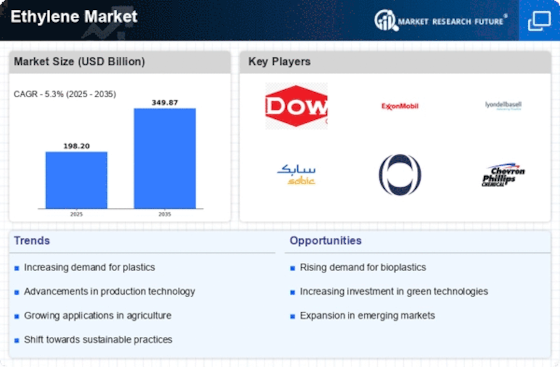Top Industry Leaders in the Ethylene Market
 Ethylene, the humble molecule with two carbon atoms and four hydrogen atoms, might seem unassuming at first glance. Yet, it dances at the heart of modern industry, forming the building block for a dazzling array of plastics, textiles, chemicals, and even antifreeze. This makes the ethylene market a veritable battlefield, where titans clash and startups scurry, all vying for a slice of the petrochemical pie. Navigating this dynamic space demands a discerning eye, tuned to the strategies at play, the factors influencing market share, and the recent developments shaping its trajectory.
Ethylene, the humble molecule with two carbon atoms and four hydrogen atoms, might seem unassuming at first glance. Yet, it dances at the heart of modern industry, forming the building block for a dazzling array of plastics, textiles, chemicals, and even antifreeze. This makes the ethylene market a veritable battlefield, where titans clash and startups scurry, all vying for a slice of the petrochemical pie. Navigating this dynamic space demands a discerning eye, tuned to the strategies at play, the factors influencing market share, and the recent developments shaping its trajectory.
Market Share: A Symphony of Drivers
Several factors orchestrate the dance for market share in this hydrocarbon arena:
-
Global Economic Growth: Booming economies, particularly in developing nations like China and India, fuel demand for ethylene-derived products, driving market expansion. -
Feedstock Availability: Natural gas and ethane are the primary feedstocks for ethylene production. Access to secure and affordable supplies is crucial for long-term success. -
Technological Advancements: New advancements in cracking technologies and catalyst systems improve efficiency, reduce production costs, and unlock new ethylene sources, like liquefied petroleum gas (LPG). -
Environmental Regulations: Stringent regulations on emissions and waste treatment pose challenges but also create opportunities for cleaner production technologies and sustainable alternatives.
Strategies for Ethylene Eminence: Mastering the Petrochemical Dance
Market leaders are wielding a potent arsenal of strategies to outmaneuver their rivals:
-
Vertical Integration: Securing control over the entire value chain, from feedstock sourcing to downstream product manufacturing, ensures cost control, quality, and agility. Companies like ExxonMobil and SABIC are actively integrating upstream and downstream. -
Geographical Expansion: Establishing a strong global presence is vital for capturing market share across diverse regions. Dow Chemical and Sinopec are expanding their international footprints to tap into global demand. -
Product Diversification: Offering a diverse range of ethylene derivatives and specialty products caters to niche markets and premium segments. Chevron Phillips Chemical and Formosa Plastics are leading the charge in product diversification. -
Sustainability Focus: Investing in cleaner technologies, like renewable energy sources and carbon capture and utilization (CCU) methods, resonates with customers and regulators. Braskem and Shell are actively implementing sustainable practices.
Key Companies in the ethylene market
-
Sabic (Saudi Arabia)
-
Dow (U.S.)
-
Exxon Mobil Corporation (U.S.)
-
Royal Dutch Shell (Netherlands)
-
China Petroleum & Chemical Corporation (China)
-
Chevron Phillips Chemical Company (U.S.)
-
Total (France)
-
Lyondellbasell Industries Holdings B.V. (The Netherlands)
-
China National Petroleum Corporation (China)
-
Repsol (Spain)
Recent News
In July 2023, INEOS entered into an agreement with TotalEnergies to acquire its stake in Naphtachimie (720 ktpa steam cracker) and Appryl (300 ktpa polypropylene business). Gexaro (270 ktps aromatics business) and 3TC (naphtha storage) are currently joint ventures between the two companies. A number of other infrastructure assets are also part of this transaction, including part of TotalEnergy's ethylene pipeline network in France.
In July 2023, LyondellBasell completed its acquisition of Mepol Group. A manufacturer of recycled, high-performing technical compounds based in Italy and Poland. Mepol S.r.l. and its subsidiaries Polar S.r.l. and Industrial Technology Investments Poland Sp.z.o.o will become units within LyondellBasell's Advanced Polymer Solutions (APS) business unit. This also strengthens LyondellBasell's I&D business unit through which it offers ethylene glycol plus ethylene oxide capabilities.










